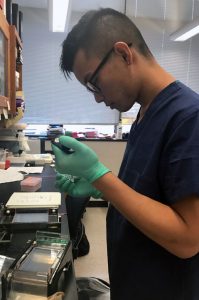Biology

Kevin is a Biology major who will graduate in 2019. The major focus of his work is to explore issues at the interface between development and human disease, with a view towards identifying novel points of therapeutic intervention. He works in Dr. Charles Bieberich’s lab on the ongoing question of homeobox gene function in mouse development intersected with human prostate cancer with the discovery of the mouse Nkx3.1 gene.
How did you find you mentor?
I work with Dr. Charles Bieberich in the Biological Sciences department. I originally came to hear of his research through searches for researching professors in cancer biology at UMBC. I then emailed him and checked by his office persistently until I was able to schedule a time to meet with him. I began researching in cancer biology during a biophysics high school summer internship at the National Institutes of Standards and Technology in radiation dosimetry. I was enthralled by cancer research ever since and knew after meeting Dr. Bieberich that his research in prostate cancer would be a perfect fit for me.
Is this your first independent research?
This is my second independent research project with the first being my radiation dosimetry project at the National Institute of Standards and Technology.
How much time do you put into it?
I spend about 15 hours an academic week in the laboratory with a 35-hour week during academic breaks and vacations.
How did you hear about the Undergraduate Research Award (URA) program?
I heard about the Undergraduate Research Award from my mentors in the Honors College. I am currently preparing my application for the 2018-19 award.
What has been the hardest part about your research?
The hardest part of conducting my research is that since I work with mice, I must be available at any given hour during the day to check on the mice and handle any circumstances that may arise from working within a murine model. It becomes difficult at times to manage working in the laboratory and working on schoolwork.
What was the most unexpected thing?
The most unexpected thing to occur from working in Dr. Bieberich’s prostate cancer laboratory is that after two years of working in the laboratory, I would be working on proposing a dietary study that involves the surprising link between prostate cancer, diabetes, and obesity. I never thought that diabetes could actually decrease prostate cancer risk.
How does your research relate to your work in other classes?
My work in the laboratory relates to many of the laboratory procedures that I learned about in BIOL141, BIOL302, and BIOL303. My newest research in the effects of diet on prostate cancer relate to my Honors College seminar on the science of obesity.
What else are you involved in on campus?
I am Treasurer of the Honors College Council, a Red Cross Volunteer, and Student Brand Ambassador for Kaplan Test Prep.
What is your advice to other students about getting involved in research?
My advice to other student about getting involved research is to never be too shy to approach a mentor about their research. Mentors are busy and may seem cold at first, but they genuinely do want to teach students about research and inspire students to become involved in research.
What are your career goals?
My career goal is to become a professor in cancer biology researching the effects of macromolecule receptors and microtubule stabilizing proteins on cancer progression.